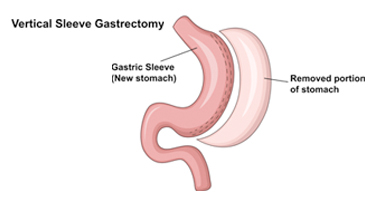Sleeve Gastrectomy

A sleeve gastrectomy, sometimes known as a gastric reduction or a vertical gastroplasty, is a restrictive form of bariatric surgery that effectively shrinks the stomach to approximately 15 percent of its original size. During the procedure, the surgeon sutures the stomach into the shape of a tube, or sleeve. Sleeve gastrectomy is commonly performed on severely obese patients who are not healthy enough to undergo a successful gastric bypass, biliopancreatic diversion or similar weight loss surgery.
Sleeve gastrectomy enables rapid weight loss with fewer complications than the more conventional weight loss surgeries, but its effectiveness is not as predictable since it does not involve a malabsorptive component. The patient's intake of food will be lessened and hunger will be decreased, but any calories are ingested will be absorbed during digestion. It may be performed as the first part of a two-part bariatric procedure. In certain cases, after some major weight loss has taken place, the patient may undergo a duodenal switch bypass procedure to promote further weight loss. Sleeve gastrectomy is one of the newer bariatric procedures. Since it has less of a track record than some other bariatric operations, it may not be covered by insurance.
Candidates for Sleeve Gastrectomy
Candidates for a sleeve gastrectomy must be prescreened to make sure the procedure is appropriate for them. Patients are typically good candidates for this procedure if they:
- Have a history of morbid obesity for several years
- Have demonstrated an inability to lose weight with diet, exercise or medication
- Have no medical or psychological conditions that preclude bariatric surgery
- Are between 18 and 65 years of age
In addition, candidates must be highly motivated to make the necessary lifestyle changes after the surgery, for their weight loss program to be successful.
Benefits of a Sleeve Gastrectomy
Like many bariatric procedures, a sleeve gastrectomy is performed laparoscopically, so the surgery is minimally invasive, resulting in smaller scars, less blood loss, less pain, and a shorter recovery period. There are a number of benefits particular to the sleeve gastrectomy as compared to other, more complex, bariatric surgeries. These include:
- No Malabsorptive Complications
- No Gastric Dumping Syndrome
- Less Hunger
- No Foreign Bands or Tubes Remain in the Body
Many weight-related medical problems are resolved after gastric sleeve gastrectomy. These may include hypertension, type 2 diabetes. high cholesterol, severe sleep apnea, heart disease and asthma. If necessary for additional weight loss, a sleeve gastrectomy can also be modified at a later date. In some cases, where weight loss resulting from the sleeve gastronomy is not sufficient, a revision surgery, such as a gastric bypass or the placement of a gastric band, may be performed.
The Sleeve Gastrectomy Procedure

The actual sleeve gastrectomy procedure is quite simple. The surgeon uses miniature tools, entering the abdomen through a small incision and stapling the stomach into the shape of a tube. This greatly reduces the stomach's capacity. Once the created "sleeve" is examined to ensure that there is no leakage or bleeding, excess stomach tissue is removed. The removal of this stomach tissue also removes part of the stomach, the fundus, where ghrelin, the hunger hormone, is produced and secreted, decreasing the patient's desire to eat.
Because sleeve gastrectomy does not alter the digestive process itself as do bariatric bypasses, no malabsorption occurs and supplemental nutrition is usually unnecessary.
Risks and Complications Associated With a Sleeve Gastrectomy
Weight-loss surgery may increase the risk for gallstones. The doctor may recommend a cholecystectomy, a surgery to remove the gallbladder, at the same time the sleeve gastrectomy is performed. Other risks of this procedure may include:
- Inflammation of the stomach
- Heartburn, or stomach ulcers
- Gastric leakage
- Scarring in the abdomen
Vomiting may sometimes occur in individuals who have had a sleeve gastrectomy, when they eat more than the stomach pouch can hold.
Recovery from a Sleeve Gastrectomy
Recovery from a sleeve gastrectomy is fairly routine. Because this procedure is less invasive than some other types of bariatric surgery, recovery tends to occur more quickly. Generally, patients remain in the hospital for a day or two, during which they ingest a liquid diet. Once they go home, they can begin to gradually reintroduce soft and then more solid foods. Doctors instructions should be followed carefully. Although a sleeve gastrectomy can be an effective tool in the struggle for weight loss, there will still be serious work for the patient to accomplish. Without serious, ongoing changes to the patient's diet and exercise regimen, the positive effects of the surgery will not be long-lasting.
Our Surgeons Specializing in Sleeve Gastrectomy

- Maria Brown, MD
- Fellowship Trained Bariatric & Foregut Surgeon
- Mesa
- Learn More

- Rita Hadley, MD, FACS, PhD
- General & Bariatric Surgeon
- Mesa
- Learn More

